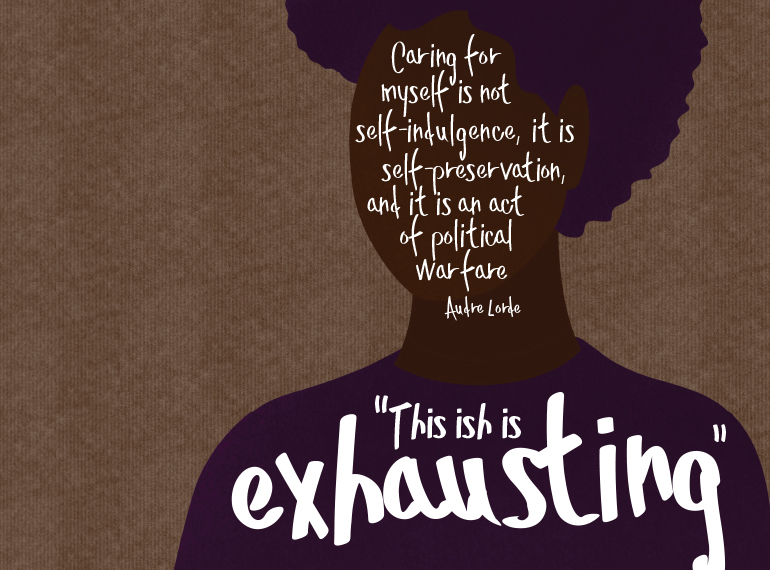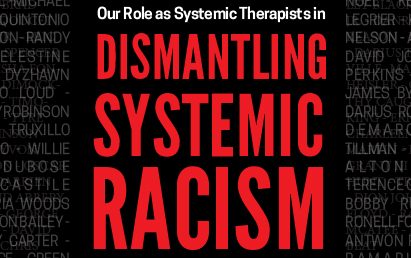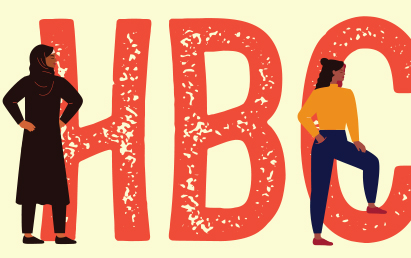This is meant to be a love letter to Black MFTs continuing the fight inside and outside the therapy room. I want to offer words of encouragement and how we can continue to sustain ourselves during this time.
When your client looks like you
Over the last few weeks, I have experienced issues of role strain as a Black person and a therapist. I have often wondered if my clinical work has been affected during this pandemic and racial uprising. I have reflected on what the current struggles are of a Black MFT working with Black clients during this time. There may be processing questions such as:
- What am I to do when my Black clients are dealing with the same structural or contextual lived experiences as I am?
- How am I to advocate for them when I am also experiencing systemic racism and structural inequality?
- How I am supposed to be emotionally present with them when I am still in the midst of processing the racial terror and uncertainty within our nation?
- How am I supposed to sit with them while they discuss their lived experiences of racism, inequality, and discrimination without being retraumatized?
- How can I avoid the likelihood of being retraumatized or experiencing secondary trauma while in therapy?
- How can I empower, uplift, encourage, and support my Black client when I myself need those things as well?
Perhaps you have the answers to these questions, or perhaps you are living in the struggle with me.
This issue is apparent during this time because, although we are systemic therapists, we are still Black people with legacies of historical trauma, racial injustice, and resilience. The role strain that Black MFTs experience can lead to additional emotional and mental labor. We then expend more energy in our clinical work compared to other MFTs, which can lead to burnout. This can cause distress for Black MFTs because we are together with our clients in processing and dealing with racial trauma. Additionally, our clinical work can be rejuvenated because we can speak to our experiences of racism or prejudice and be in community with our Black clients. However, we must find ways to process and handle any additional layers of mental and emotional strain or stress that we may be carrying from our clinical work.
Your guide to self-care as a Black MFT
Although we create space for our Black clients to share their experiences, we must also prioritize and uplift ourselves during these times. I want to provide suggestions on resiliency and longevity for the journey ahead as a Black MFT.
1. Acknowledge your emotions.
During these difficult times of a global pandemic, state-stanctioned violence and murder, environmental racism and trauma, and systemic racism, we may be dealing with various emotional experiences. I want you to acknowledge and sit with the fatigue, exhaustion, depression, panic, anxiety, insomnia, anger, disappointment, frustration, rage, and hopeless that you may be feeling. Do not excuse them away or run from them. It is okay to not be okay. It is okay to not give into the pressure to always put on a “happy face” for your peers, clients, family members, friends, or larger society. I want you to give yourself the permission to feel, and to process all of what you may be carrying and experiencing. I want you to hold space for all of those realities. As systemic therapists, we allow our clients to sit with the complexities of their experiences … so I want you to do the same for yourself.
2. Discover the comfort of joy.
It can be difficult to want to find pleasure or joy or laughter in pivotal moments of racial resistance and uprising. In these times, Black people are also grieving and mourning the untimely deaths of Black people everywhere. Further, we are constantly reminded of our racist history while trying to remain abreast of the latest political updates and social discourse. It is important for us to stay connected to the movement and stay informed on what is happening in our world. However, in staying constantly plugged in and being consumed with the frequent messages in the harsh realities of our experiences, this can negatively impact our mental and emotional wellness. We can sometimes forget there is power and healing in our joy and our laughter. Thus, I encourage us to be intentional about how we engage in social media, news outlets, think pieces, talking with family/friends, etc. We must prioritize moments where we can laugh or experience joy that exemplifies the resiliencies of our culture. We cannot forget how our ancestors found healing in song and dance, poetic expression, and comedic relief. No one’s laughter is as powerful as ours. We can uplift and encourage ourselves with joy and laughter. Our survival depends on us finding moments to rest and to have joy.
3. Be kind to yourself.
Oftentimes, we may feel that we are not doing enough, or that we need to be working harder. We may feel guilt or shame in wanting to take time for self and care for self. Burnout or compassion fatigue should not be normalized and is a danger (Mullan, 2020). I want to encourage us to resist this narrative that taking care of oneself is not resistance. Similar to us being intentional about how to engage within the fight, we can be intentional about how we disengage. Our self-care practices are based in resistance and a form of loving ourselves. “I am resisting the notion that my worth is tied to my work. I am resisting the notion that my personhood is tied to my performance” (Dodson, 2020). My activism is also seen through my self-care. Thus, I am loving myself in doing my self-care practices. Our self-care is liberating for us and for our community. I encourage us to engage in self-care that is a range of activities tapping into our mind, body, and spirit. Also, self-care is about community and connection. In connecting with other Black MFTs, you are engaging in collective self-care and self-love. No one needs “caring for self” like Black people do because of our history of chronic systemic oppression and dehumanization. We can begin to shape how self-care should look for us that is not dominated by white supremacist values or perspectives.
4. Cultivate moments of rest.
Dr. Thema Bryant-Davis (2020) said, “our rage will not sustain us. Your rest is revolutionary.” We may also feel guilt or shame in wanting to have moments of rest, but rest is restorative and transformative. We need times where we can rest, restore, and heal. In order to continue to live with the discrimination, microaggressions, and racial trauma in being Black, we must take time for ourselves. In those moments of rest, we are reminded of the beauty and vibrance of our culture, of all the heartache and pain we have overcome, of our resiliency and tenacity to continue to thrive, but also of our vulnerabilities and humanity. Our rest allows us to connect to our authenticity and share it in every space that we inhabit, including the therapy room. Our rest energizes us for the movement and to continue the work with our clients. This is why rest is vital for our survival, as well.
5. Decolonize your therapy.
It is apparent that the founding principles and theorists of our field were not Black people. Thus, our identities or lived experiences did not shape the historical principles or therapeutic practices that we enact today. Hence, I suggest we begin to decolonize our therapy space, especially in working with Black clients. We must unlearn the racial, stereotypical, white supremacist, and colonized notions about the Black family, and Black men, women, trans, and queer identities that we were trained under when we entered the field. We must humanize our stories and lived experiences. Your clinical practice may involve having a contextual or structural lens when examining client experiences, incorporating cultural resiliencies and rituals that are strengths-based, giving space for, or working collaboratively with, clients to express their full selves in therapy. This idea may be challenging for Black MFTs to consider, but it is needed in our work to dismantle white supremacy as a nation and field.
6. Seek out community.
I want you to know that you are not alone. There are Black MFTs out in the world although it may seem at times that you are the only one. In caring for yourself, you also can reach out to the Black MFT community. It is time for Black MFTs to come together and form our own connection because we need each other. We need to make attempts to build our village among AAMFT and form our own networks to fight against our invisibility within AAMFT. Our community is important, and our collective is important. Within community, you can gain support, encouragement, and rest. Our collective action is needed within AAMFT, but it starts first with us coming together and forming connections across state lines and institutions.
Implications for the AAMFT field
Thus, how can the AAMFT field continue to support Black therapists during frequent broadcasts of police brutality, systemic racism, and the pandemic? First, we must have our own space and we must create our own village. I, alongside other Black MFTs, are considering implementing a Black MFT interest network group as a segment within AAMFT. Our goal would be to connect Black MFTs together, share resources and experiences, form connections and mentorships, and collaborate on research or publications. This group would be designed to center Black MFT voices and connect MFTs across intersectional identities (gender, sexual orientation, ability, age, religion, etc.), as well. If you are interested in joining after reading this article, please connect further with me. Second, AAMFT must support the creation of an MFT program(s) on HBCUs (Historically Black Colleges and Universities). We must go beyond saying we verbally support Black Lives Matter and the uplifting of Black experiences to more action-oriented steps. Forming an MFT program on a predominately Black campus(es) would exemplify the principles of structural and systemic change that we as systemic therapists have been trained to believe are the core foundations within our field. This action is necessary and needed to begin to saturate our field with Black therapists. Additionally, having MFT programs based in predominately Black spaces will also increase representation out in the world to meet the continued need for more Black therapists to treat the distinct needs of racial-ethnic families. It is my hope that you (Black MFTs) have felt loved and seen with this article. In essence, we (AAMFT) need you…. I (the Black MFT community) need you… and they (Black clients) need you. Seek rest my dear…you deserve it.
No one’s laughter is as powerful as ours. We can uplift and encourage ourselves with joy and laughter. Our survival depends on us finding moments to rest and to have joy.

Joslyn Armstrong, PhD, currently serves as an assistant professor in the Marriage, Couple, and Family Therapy program at Lewis & Clark College. Her research focus centers around Black fatherhood, father identity, and the father-child relationship quality. Additionally, she examines the sociocultural factors related to fatherhood such as discrimination and mental health stressors. She is a Pre-Clinical Fellow of AAMFT and has presented at AAMFT and NCFR.
REFERENCES
Juneteenth reflection and celebration [Conference session]. Academics for Black survival and wellness. Retrieved from https://www.academics4blacklives.com
Dodson, M. (2020, June 19-25). Self-care at the intersections [Conference session]. Academics for Black survival and wellness. Retrieved from https://www.academics4blacklives.com
Mullan, J. (2020, June 19-25). Decolonizing the academy [Conference session]. Academics for Black survival and wellness. Retrieved from https://www.academics4blacklives.com
Other articles
Our Role as Systemic Therapists in Dismantling Systemic Racism
In the grand scheme of things, we are all mental health professionals and add to the racial disparities in the provision and access of mental health services.
Danielle Samuel, MS
Why Aren’t There Any MFT Programs at Historically Black Colleges or Universities?
Expanding the Reach of MFT Education and Training.
Leslie Anderson, PhD
“Academia was not created with me in mind”
Faculty of color are disproportionately underrepresented in higher education. While colleges and universities across America have seen increased growth in diverse students attending college, there appears to be an imbalance in representation of racially diverse faculty.
Denise Williams, PhD



